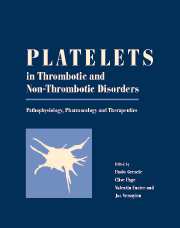Book contents
- Frontmatter
- Contents
- List of contributors
- Editors' preface
- PART I PHYSIOLOGY
- PART II METHODOLOGY
- PART III PATHOLOGY
- 34 Hereditary thrombocytopenias
- 35 Thrombocytopenias due to bone marrow disorders
- 36 Immune-mediated thrombocytopenia
- 37 Thrombocytopenia in childhood
- 38 Alloimmune thrombocytopenia
- 39 Drug-induced and drug-dependent immune thrombocytopenias
- 40 Thrombotic thrombocytopenic purpura and hemolytic uremic syndrome
- 41 Thrombocytosis and thrombocythemia
- 42 Platelet adhesive protein defect disorders
- 43 Congenital disorders of platelet secretion
- 44 Congenital platelet signal transduction defects
- 45 Acquired platelet function defects
- 46 Platelet storage and transfusion
- 47 Pathophysiology of arterial thrombosis
- 48 Platelets and atherosclerosis
- 49 Platelet involvement in venous thrombosis and pulmonary embolism
- 50 Gene regulation of platelet function
- 51 Platelets and bacterial infections
- 52 Interactions of viruses and platelets and the inactivation of viruses in platelet concentrates prepared for transfusion
- 53 Platelets and parasites
- 54 Platelets and tumours
- 55 Platelets and renal diseases
- 56 Platelets and allergic diseases
- 57 Platelet interactions with other cells related to inflammatory diseases
- 58 Platelets and the preimplantation stage of embryo development
- 59 Platelets in psychiatric and neurological disorders
- 60 Platelets in inflammatory bowel disease
- PART IV PHARMOLOGY
- PART V THERAPY
- Afterword: Platelets: a personal story
- Index
- Plate section
35 - Thrombocytopenias due to bone marrow disorders
from PART III - PATHOLOGY
Published online by Cambridge University Press: 10 May 2010
- Frontmatter
- Contents
- List of contributors
- Editors' preface
- PART I PHYSIOLOGY
- PART II METHODOLOGY
- PART III PATHOLOGY
- 34 Hereditary thrombocytopenias
- 35 Thrombocytopenias due to bone marrow disorders
- 36 Immune-mediated thrombocytopenia
- 37 Thrombocytopenia in childhood
- 38 Alloimmune thrombocytopenia
- 39 Drug-induced and drug-dependent immune thrombocytopenias
- 40 Thrombotic thrombocytopenic purpura and hemolytic uremic syndrome
- 41 Thrombocytosis and thrombocythemia
- 42 Platelet adhesive protein defect disorders
- 43 Congenital disorders of platelet secretion
- 44 Congenital platelet signal transduction defects
- 45 Acquired platelet function defects
- 46 Platelet storage and transfusion
- 47 Pathophysiology of arterial thrombosis
- 48 Platelets and atherosclerosis
- 49 Platelet involvement in venous thrombosis and pulmonary embolism
- 50 Gene regulation of platelet function
- 51 Platelets and bacterial infections
- 52 Interactions of viruses and platelets and the inactivation of viruses in platelet concentrates prepared for transfusion
- 53 Platelets and parasites
- 54 Platelets and tumours
- 55 Platelets and renal diseases
- 56 Platelets and allergic diseases
- 57 Platelet interactions with other cells related to inflammatory diseases
- 58 Platelets and the preimplantation stage of embryo development
- 59 Platelets in psychiatric and neurological disorders
- 60 Platelets in inflammatory bowel disease
- PART IV PHARMOLOGY
- PART V THERAPY
- Afterword: Platelets: a personal story
- Index
- Plate section
Summary
Thrombocytopenia is a common manifestation in many bone marrow disorders. As bone marrow is the site of platelet production, it is not surprising that bone marrow diseases would cause thrombocytopenia. It is pertinent to review briefly the regulation of platelet production, and how it could be adversely affected by bone marrow diseases.
Regulation of platelet production
Platelets are produced in the bone marrow by cytoplasmic budding of their precursor cell, the megakaryocyte. The megakaryocyte itself is derived from the hematopoietic stem cell by a series of cell proliferation and differentiation processes. These processes are controlled by a network of growth factors, the most important of which is thrombopoietin, TPO. These processes also involve a specific program of gene expression mediated by transcription factors such as GATA-1, FOG-1, Fli-1 and NF-F2. Mouse knockout studies revealed that disruption of the TPO gene, and genes of these transcription factors, resulted in marked impairment of megakaryocyte development, severe thrombocytopenia and/or serious bleeding.
TPO exerts its effect by binding to its receptor, c-mpl on megakaryocytes and their precursor cells. TPO-c-mpl interaction induces activation of intracellular signal transduction pathways (Fig. 35.1) including Jak2 / STAT 3/5, protein kinase C (PKC) and MAPK kinase pathways. The signalling pathway activation ultimately leads to activation of specific transcription factors, e.g. GATA-1. The activated factor then translocates to the nucleus and binds to the regulatory region of a target gene involved in megakaryocyte proliferation and differentiation.
- Type
- Chapter
- Information
- Platelets in Thrombotic and Non-Thrombotic DisordersPathophysiology, Pharmacology and Therapeutics, pp. 528 - 541Publisher: Cambridge University PressPrint publication year: 2002



